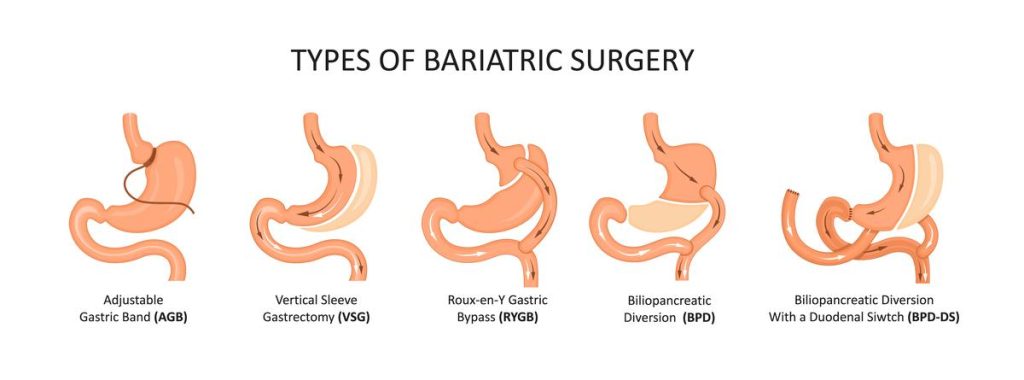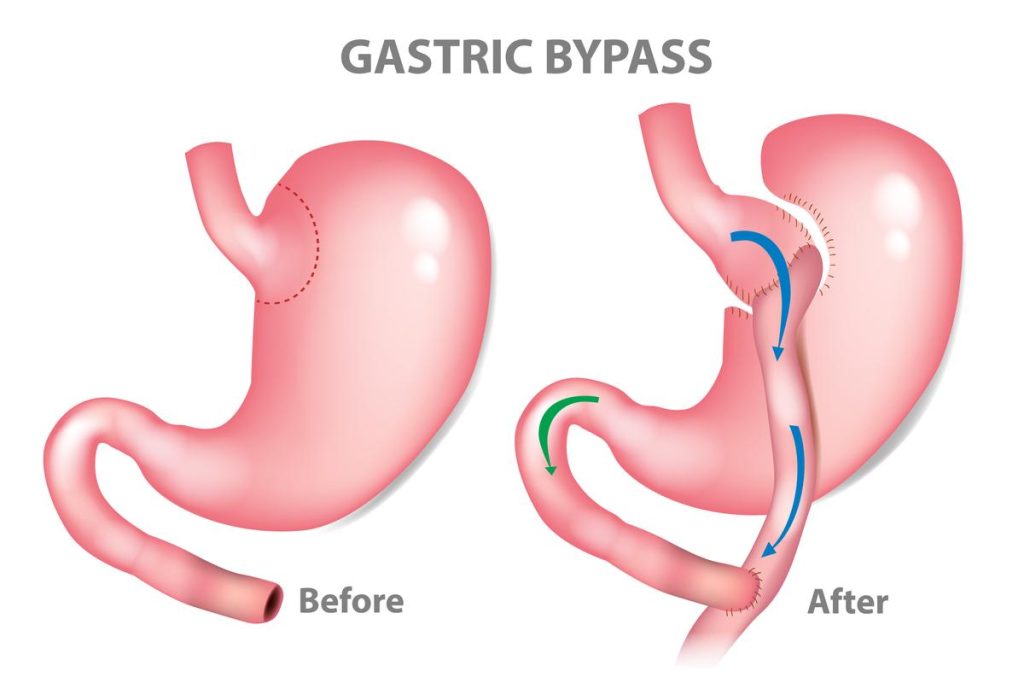Gastric Bypass Surgery
The gastric bypass, also known as “Roux-en-Y,” is a surgical method for losing weight in a medical context. It operates by altering your digestive system. Gastric bypass surgery decreases the size of your stomach and shortens your small intestine, leading to a decrease in the number of calories you intake and absorb.

When should I consider gastric bypass surgery?
If you are extremely overweight and have additional health issues, and have made significant attempts to shed pounds through diet and increased physical activity, your physician might recommend gastric bypass surgery as an option to aid weight reduction.
Gastric bypass surgery is a highly successful surgical procedure for reducing weight, however, it is not suitable for everyone. Have a conversation with your doctor to determine the most suitable approach for your situation and discuss any expectations. Don’t hesitate to inquire about:
- What is the typical amount of weight that is lost within one year?
- What is the typical amount of weight lost after a five-year period?
- What’s my role after surgery?
Shedding pounds post-gastric bypass procedure can potentially alleviate issues related to type 2 diabetes, asthma attacks, and high blood pressure, thereby enhancing heart wellbeing.
Benefits of Gastric Bypass Surgery
Gastric bypass surgery is a highly efficient and beneficial procedure for individuals struggling with obesity. It will result in a reduced stomach size, leading to a sensation of fullness soon after consuming food. In summary, this surgery offers numerous advantages such as:
- Shed a significant amount of extra pounds in a brief period of time, reducing your weight by 60 to 80%!
- Restrict the amount of calories and nutrients that your body is able to take in from the food you consume.
- Restrict the volume of food your stomach can accommodate or retain.
- Stay satiated for a longer duration and reduce your desire to eat.
- Achieve enduring outcomes and mitigate health issues associated with obesity.
- Improve your gut hormones and address metabolic syndrome resulting from obesity by introducing positive changes.
- Take inspiration from famous people like Sally Morgan and Randy Jackson, who have previously undergone surgery to combat obesity.
Is Gastric Bypass Surgery Right For Me?

There are several benefits to undergoing gastric bypass surgery:
- Excellent results can be achieved in terms of losing weight in the short term, with a reduction of 60 to 80 percent of the excess weight.
- Long-term effects that persist over time have been observed in the data, indicating that the majority of patients continue to maintain at least 50 percent of the weight they had originally lost, even up to 20 years after undergoing surgery.
- Outstanding resolution of health issues associated with obesity.
We provide information sessions at rehabturk twice a month, led by our specialists, to assist you in deciding whether gastric bypass surgery is suitable for your needs. Although this procedure has numerous advantages, there are also potential drawbacks to consider.
- The rate of long-term complications is slightly higher compared to sleeve gastrectomy. However, these complications can be prevented with proper care.
- After surgery, patients are prohibited from consuming aspirin or any other NSAIDS.
- After undergoing surgery, it is essential for all patients to continue taking vitamins indefinitely. Failing to do so may result in enduring deficiencies of vital vitamins and minerals, including vitamin B12, iron, calcium, and folate.
What happens during gastric bypass surgery?
Gastric bypass surgery is conducted with the patient under general anesthesia and typically requires a hospital stay lasting between 3 to 5 days.
Typically, the surgery is performed using minimally invasive techniques, although there are instances where a more invasive approach may be necessary.
While performing the procedure, staples are employed to construct a tiny pocket in the upper section of the stomach, as depicted in the accompanying image.
Stitches are used to connect the pouch to the lower section of the small intestine, allowing food to avoid a large portion of the stomach and the initial portion of the small intestine.
The body will absorb less food, causing you to feel satiated with a smaller portion.

Recovery After Gastric Bypass Surgery
After undergoing this surgery, it is expected that patients will typically stay in the hospital for a period of 2-5 days. During the recovery stage, there may be certain activities or treatments involved.
- Anticipate feeling a high level of fatigue and weariness, however, it is still important to partake in brief strolls within your residence to aid in the process of recuperation.
- To ensure the best possible wound healing and protect against infection, it is important to adhere to the post-operative instructions provided by your surgeon.
- After the surgery, it is recommended to consume soft and liquid foods, gradually transitioning to solid meals within a few weeks. A dietician will offer appropriate guidance on this significant issue.
- Ultimately, it might be necessary for you to include vitamin and mineral supplements in your diet as a means of replenishing the essential nutrients that are usually absorbed in the sections of your digestive system that have been bypassed.
How much weight can you lose with gastric bypass surgery?
On average, patients can usually anticipate losing about 70% of their body fat within two years after undergoing the surgery. Nevertheless, those who undergo the gastric bypass can anticipate losing approximately 10% additional body fat.
Treatment in Türkiye:
The medical staff of surgical teams, doctors and consultants in Rehab Türk can provide the best treatment options and free consultations – by striving to keep abreast of the latest medical technologies and methods.
